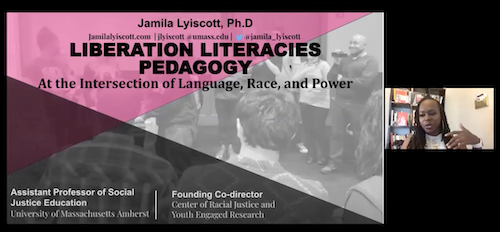 On Saturday, October 23, Bank Street Graduate School of Education hosted the Language Series conference online, an annual event to help educators strengthen their practice with developmentally appropriate language learning tools, techniques, and ideas. This year’s topic, “Language Teaching and the Arts,” opened up a powerful discussion about using language in ways that can disrupt the inequities that permeate our school systems and our larger world.
On Saturday, October 23, Bank Street Graduate School of Education hosted the Language Series conference online, an annual event to help educators strengthen their practice with developmentally appropriate language learning tools, techniques, and ideas. This year’s topic, “Language Teaching and the Arts,” opened up a powerful discussion about using language in ways that can disrupt the inequities that permeate our school systems and our larger world.
The keynote presentation was led by Dr. Jamila Lyiscott, or “Dr. J,” aspiring way-maker, community-engaged scholar, nationally renowned speaker, author, and assistant professor of social justice education at the University of Massachusetts Amherst, where she is the co-founder and co-director of the Center of Racial Justice and Youth Engaged Research. Her captivating presentation centered on the relationship between language, race, and power, and how we can shift our understandings of language and literacy in ways that affirm the cultural identities of language-minoritized children.
“The way that we use language in our classrooms every day has the power to uphold or disrupt social injustice. I am deeply grateful and moved and honored to be in this space with you,” said Lyiscott as she welcomed virtual conference attendees.
In her presentation, Lyiscott urged educators to think about literacy and language as broader than the narrow definitions that they often take in classrooms and other learning environments. She noted that, instead of imposing prescriptive interpretations of what it takes to be “literate,” it’s crucial to approach literacy and language in ways that celebrate how children use their own cultural funds of knowledge to communicate and understand their worlds.
According to Lyiscott, language learning should be a “source of liberation, a space of political and social and ideological disruption.” On her screen, she pulled up the historic words of Gilbert Highet, a mid-20th-century teacher of the humanities in the United States: “Language is a living thing. We can feel it changing. Parts of it become old: they drop off and are forgotten. New pieces bud out, spread into leaves, and become big branches, proliferating.”
Lyiscott’s presentation also referenced real-world examples of the intersection of language, race, and power. For instance, she discussed the murder of George Floyd as an example of how language suggesting that “underlying causes” and “intoxicants in his system” led to his death can “write a narrative into our consciousness” that is harmful and places blame on people of color.
“The reason this is urgent—when we think about the concept of literacies and language as broader than just the transaction of words and what it means for us to read and write the world—is because we are constantly immersed in this authorship,” she said. “We are constantly immersed in this consumption of our world, and it’s conditioning and socializing us to believe how we must operate in the world that we are existing in.”
In another example of the power of language, Lyiscott described a Netflix show created by Ava DuVernay, When They See Us, which recounts the story of a group of five Black teens who were wrongly accused of and incarcerated for a brutal attack in Central Park in 1989. In the show, DuVernay refers to the group as “The Exonerated Five” instead of “The Central Park Five” to rewrite the narrative and shed light on their story as one of justice. Lyiscott explained:
“That renaming, the assertion that this is now the Exonerated Five and not the Central Park Five, is a re-authoring. It’s a re-scription, it’s a renaming, it’s a reclamation of our narratives, and this is what it means to read and write the world, to be intentional about decoding the narrative that we see and that feeds us and how we also perpetuate and disrupt through the power of language.”
Another powerful moment in the presentation was an exploration of Liberation Literacies, an approach to pedagogy that invites students of minoritized backgrounds to engage with curricula that affirms their linguistic heritage. Lyiscott invited the audience to harness this approach in their own work to challenge a view of literacy that attempts to erase the cultural identities of students and instead prepares students for our multiethnic, multilingual, globalized society.
After a Q&A session with Lyiscott that was facilitated by Carla España, Language Series Coordinator, and professor at Teachers College, Columbia University, conference attendees convened in virtual workshops centered on this year’s theme. Topics included “From Photographs to Words to Politics: Building Language and Learning Migration through the Visual Arts (All Grades)” with Dr. Tatyana Kleyn and Yauzin Martínez García; “The Use of Critical Literacy Practices to Nourish a Humanizing Pedagogy in a Dual Language Classroom (Early Childhood)” with Dr. Sandra L. Osorio, Jeanette Delgado, and Emma Lewis; and “Humanizing Language Expansion through Drama (Middle Grades & High School)” with Helio Sepulveda, Susanna Brock, and Yusi Gao, among others.